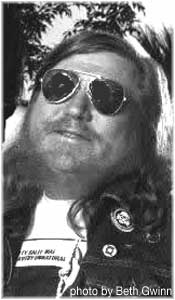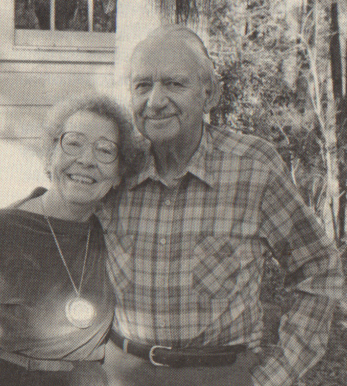Lost in Loss
Friday, October 16, 2009
posted by Steve Trout
 Print This Post
Print This Post

Karl Edward Wagner chose to attend the University of North Carolina largely because he would be able to meet one of his favorite writers, Manly Wade Wellman. Wellman had been a writer for the old Weird Tales pulp, among many others, though he no longer wrote fantasy or horror. As they became fast friends, Karl convinced Manly to return to the fold. Frances Wellman wrote that Karl became a loving friend for the rest of his life.
Considering that Karl’s relationship with his own somewhat distant father was strained –and what father would want his son to give up medicine for writing, as Karl intended to do and eventually did? — it seems likely inevitable that Manly would become both mentor and father-figure to the “big Dutchman”, as he called him. Conversely, Manly’s own son Wade seems likely to have been a disappointment to him, as David Drake reports he was living in a “charity hostel” because of substance abuse issues at the time of his mother’s death. Not that Karl was free of substance abuse issues himself, of course.
Even though he never practiced medicine, and was quite aware of the failings of the medical community, including the hubris of the men who held the power of life or death in their hands, Karl was educated as a doctor and would sometimes refer to himself as one. See Philip Challinoor’s “No-one Gets Well in Hospital” and John Mayer’s “The Dark Muse of Karl Edward Wagner” for some interesting additional information on this.
In the late 70’s, at the height of his career, with a contract for three Conan pastiches, Karl suddenly got writer’s block. Or something happened. His drinking picked up to an alarming rate. He wrote of being in despair, but didn’t write much else. He did continue to edit The Year’s Best Horror series, though.
Fast forward to 1986. I had called Karl up to invite him to my house for a party, on the occasion of some of our mutual friends being in town and them wanting to get together with him and Barbara. I had explained how to get there, mentioning that you had to cross a blue bridge across the Little River and then look for the next left, and he seemed to be drunkenly whimsical about the idea of a blue bridge for some reason. Then I asked the question any fan would ask, and which he was no doubt very tired of hearing: “When are we going to see some more of your stuff come out?” He replied, shortly, that he had been spending all his time “keeping Manly alive.”

I hadn’t known that he was looking after Manly, who had taken a fall early that year and developed bedsores that led to amputations. But I did know that it struck me as the hubris of a doctor facing down fate, God, or whatever you want to call the inevitable, and that it would not end well. When Manly finally died, Karl cried unabashedly in Frances’ arms.
After that, the drinking wasn’t for fun, or to put off facing his tasks, it was for solace. And the need for solace never went away. At least, that’s what I think. I think Karl’s similarity to Robert E. Howard extended to the inability to deal with the loss of a loved one, and that’s what ultimately killed him. It was a waste and a damn shame.
